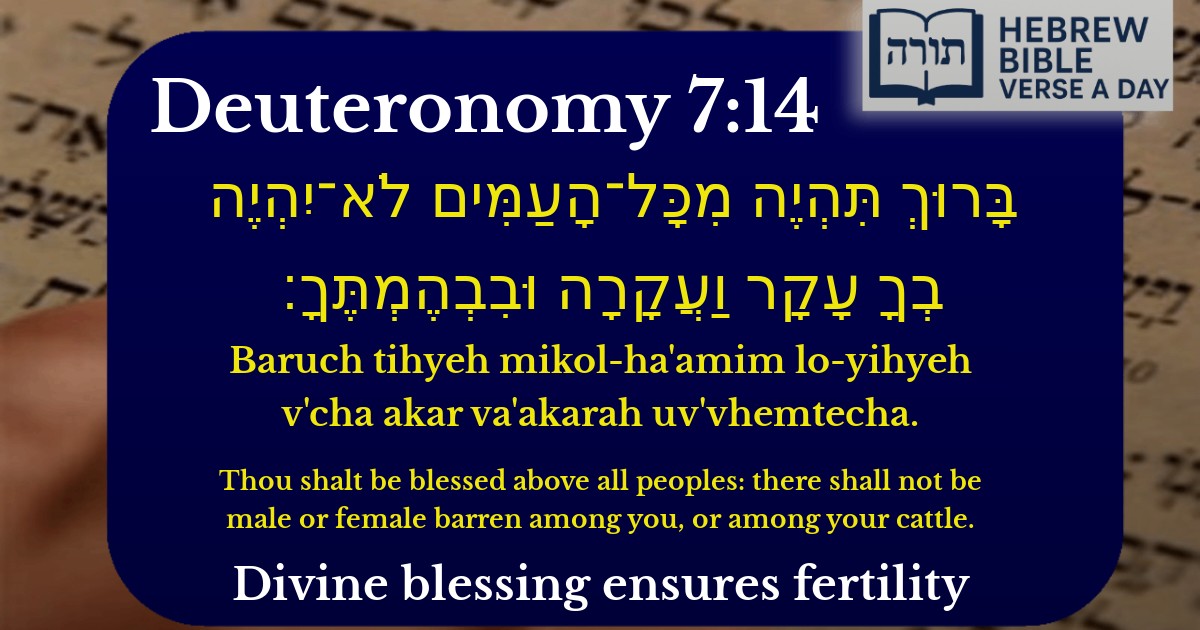Frequently Asked Questions
Q: What does Deuteronomy 7:14 mean when it says 'Thou shalt be blessed above all peoples'?
A: This verse is part of the blessings promised to the Jewish people for keeping the Torah and its commandments. Rashi explains that this blessing signifies that the Jewish people will be uniquely distinguished among nations in both spiritual and physical prosperity when they remain faithful to Hashem.
Q: Why does the Torah mention barrenness in people and animals as part of the blessing?
A: The Talmud (Bava Metzia 42a) teaches that fertility—both in humans and livestock—is a sign of divine blessing. The Rambam (Hilchos Teshuva 9:1) also explains that material and physical well-being are often indicators of spiritual closeness to Hashem when they come as a result of following the Torah.
Q: How does this verse apply to us today?
A: The Sforno teaches that these blessings are conditional upon our commitment to Torah and mitzvos. Today, we understand that while physical blessings may manifest differently, the principle remains: faithfulness to Hashem brings divine favor in all aspects of life, including health and sustenance.
Q: What is the significance of the blessing extending to cattle?
A: The Midrash (Devarim Rabbah 3:6) explains that Hashem’s blessings encompass all aspects of livelihood, including one’s possessions. Fertility in livestock symbolizes prosperity and sustenance, showing that divine kindness extends even to the animals that support human livelihood.
Q: Does this mean that barrenness is a punishment?
A: The Ramban (Deuteronomy 7:12) clarifies that while fertility is a blessing for righteousness, barrenness is not necessarily a punishment—sometimes it serves a higher divine plan (as seen with our foremothers Sarah, Rivkah, and Rachel). However, the verse highlights that collective faithfulness brings widespread blessing, including the removal of such hardships.


Blessing of Fertility in the Jewish People
The verse (Devarim 7:14) promises a special blessing of fertility to the Jewish people, distinguishing them from other nations. Rashi explains that this blessing is contingent upon observing the mitzvot, particularly the prohibition against intermarriage mentioned in the preceding verses. The absence of barrenness—both in humans and animals—symbolizes divine favor and the fulfillment of the covenant with Avraham Avinu, where progeny was a central promise (Bereishit 15:5).
Physical and Spiritual Fertility
The Ramban (Nachmanides) expands on this concept, noting that the blessing extends beyond physical fertility to spiritual productivity. A nation without "barrenness" reflects a people whose Torah learning and mitzvot bear fruit, just as their families and livestock thrive. The Talmud (Bava Metzia 42a) similarly connects material blessings with spiritual merit, teaching that prosperity follows those who dedicate themselves to Torah and chesed.
Inclusion of Animals in the Blessing
The mention of fertility in livestock (וּבִבְהֶמְתֶּךָ) underscores the holistic nature of divine berachah. The Sforno comments that this reflects Hashem's desire for Israel's complete well-being—where even their possessions reflect kedushah. The Midrash (Tanchuma, Eikev 1) adds that just as Klal Yisrael is fruitful, so too will their animals be, reinforcing the idea that their material success is intertwined with their spiritual mission.
Contrast with Other Nations